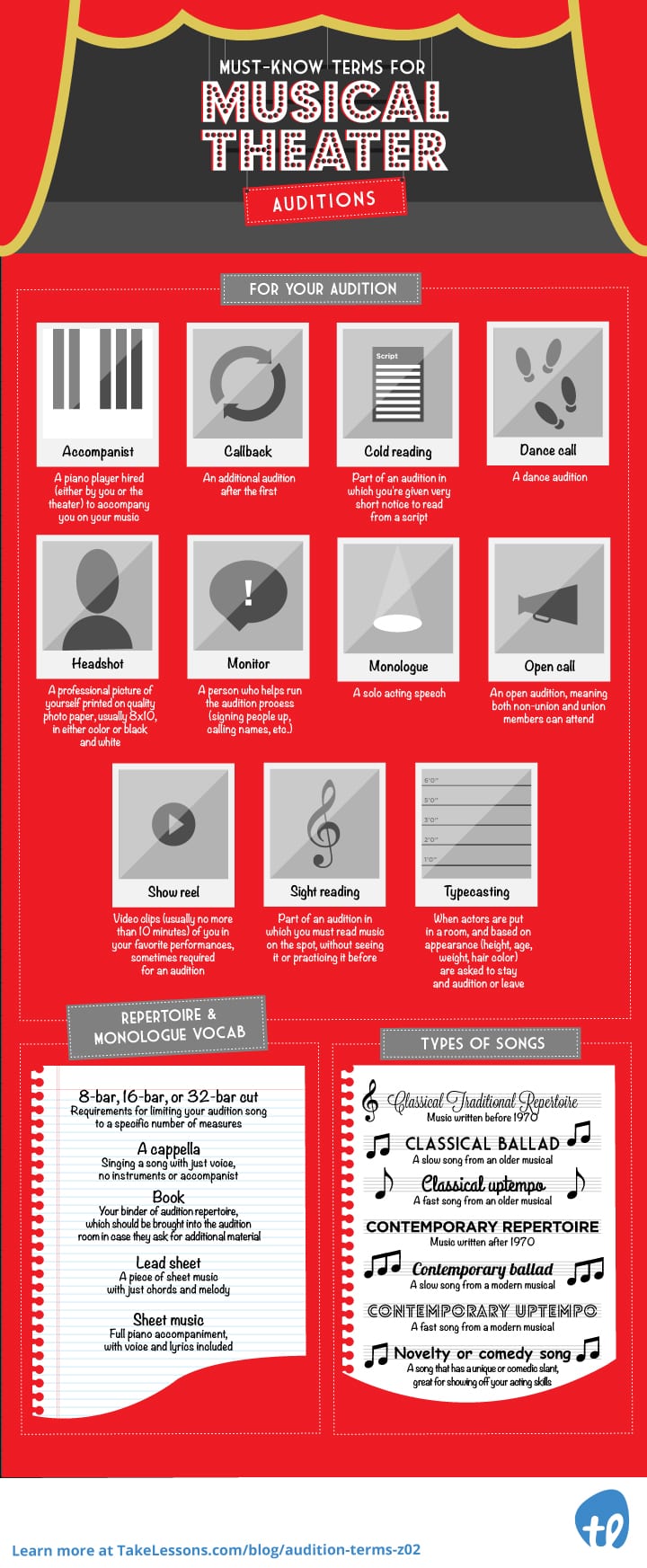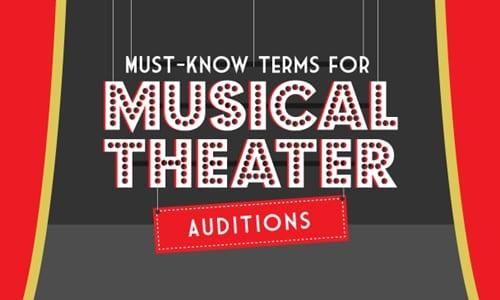Come across like a professional at your next audition! Check out this glossary of important theater and acting terms, put together by voice/acting teacher Liz T...
Are you preparing for a musical theater audition? As you look at your materials, you may be wondering what a “cold reading” is, or which audition songs count as contemporary ballads.
And even once you’re past the audition (congrats!), you might find yourself backstage or on a movie set and hear the director shouting words and phrases you don’t recognize.
Don’t worry! Many singers and actors are unfamiliar with the terms used in the musical theater industry at first. Below, we’ve put together a list of the most common audition terms and vocab you should know.
The infographic highlights several important ones, but scroll down further to see even more must-know words and phrases!

Audition Terms
- Accompanist: a piano player hired (either by you or the theater) to accompany you on your sheet music
- Callback: an additional audition after the first… sometimes you’ll be called back as many as 10 times!
- Cold reading: part of an audition in which you’re given very short notice to read from a script, either as a monologue or with a scene partner (may be given to you on the spot)
- Dance call: a dance audition
- Headshot: a professional picture of yourself printed on quality photo paper, usually 8 x 10, in either color or black and white
- Monitor: a person who helps run the audition process (signing people up, calling names, etc.)
- Open call: an open audition, meaning both non-union and union members can attend
- Showreel: video clips (usually no more than 10 minutes) of you in your favorite performances, sometimes required for an audition
- Sight reading: part of an audition in which you must read music on the spot, without seeing it or practicing it before (more sight reading tips for singers here).
- Typecasting: when actors are put in a room, and based on appearance (height, age, weight, hair color) are asked to stay and audition or leave. This may either be announced before an audition or happen on the spot.
- Monologue: a solo acting speech
Audition Terms / Repertoire & Monologues
- 8-bar, 16-bar, or 32-bar cut: requirements for limiting your audition song to a specific number of measures
- A cappella: singing a song with just voice, no instruments or accompanist
- Book: your binder of audition repertoire, which should be brought into the audition room in case they ask for additional material
- Lead sheet: a piece of sheet music with just chords and melody — some auditions may state “no lead sheets,” meaning your music must include the full piano part
- Sheet music: full piano accompaniment, with voice and lyrics included
- Contemporary repertoire: music written after 1970
- Classical/traditional repertoire: music written before 1970
- Classical ballad: A slow song from an older musical
- Classical uptempo: A fast song from an older musical
- Contemporary ballad: A slow song from a modern musical
- Contemporary uptempo: A fast song from a modern musical
Theater Terms / Rehearsals & Performances
- Broadway: commercial theaters with a minimum of 499 seats in NYC
- Call time: when you’re expected to report to the theater for a rehearsal or performance
- Costume fitting: when measurements are taken for your costume; may be a separate appointment
- Dark: when the theater is closed (usually on Mondays).
- Dressing room (or green room): where the actors get ready with their costumes and makeup; a safe space to warm up before the performance
- Dress rehearsal: one of the last final performances before the show opens, with costumes added
- Ensemble: the chorus that sings and acts throughout the show.
- Limited engagement: when a show runs for a specific length of time, anywhere from 4 to 12 weeks
- Marquis: a poster outside the theater with the show’s name, picture, and headlining actors
- Matinee: a performance during the day, usually between 1 and 3 on Wednesdays and Saturdays.
- National tour: a production that tours around a number of cities each week, instead of being established in one venue
- Off-book: rehearsing without your script, so you must have your lines memorized
- Off-Broadway: a theater in NYC with fewer than 499 seats, but more than 99 seats
- Off-Off Broadway: a theater in NYC with fewer than 99 seats, and usually not-for-profit
- Playbill: the official program given at each performance with the cast credits, pictures, and info about the show
- Previews: when the show is running in previews, this means it isn’t the official opening yet, so there’s still time to work out any problems
- Prop table: backstage where all of the props and materials for the show are placed
- Sitzprobe: one of the first rehearsals with the orchestra or band, meant to review the music together
- Stage directions: quick terminology to use on stage when blocking a scene on a stage (see expanded section below)
- Standing only: a limited number of tickets sold for the back of the theater, where patrons can stand and watch the show when seating is sold out
Theater and Acting Terms / Other Vocab to Know
- Non-Union: a person who doesn’t have a membership or an invitation to the Actors’ Equity Union
- Union: a person belonging to and being a paid member of the Actors’ Equity Union
- EMC: stands for Equity Membership Candidate, meaning you have acquired enough points at equity theaters to be considered for membership in the Actors’ Equity Union
- Actors’ Equity: the official union for professional actors
- Backstage Magazine: A subscription magazine (also available online) that announces all upcoming auditions in major cities
Important Notes
Your Headshot
This is a very important theater term to know, because many auditions will require one! This is a clear, professional picture of yourself, usually on high-quality stock paper and 8×10. It can be in either black & white or color, and should be from the shoulders up or can be a close-up of your face.
Please note that this is different from a “selfie” because of the lighting, contrast, and angle. It’s definitely worth researching professional photographers in your area; the cost will usually range from $200 to $1,200 and you’ll get few different headshots. If you’re on a budget, you can even find a local high school or college student to take them for you.
Before you book a photographer, check out their portfolio and make sure you have a contract in writing. Wear something you feel comfortable in that brings out your personality. Also, these photos should look like you do naturally — so don’t wear heavy makeup if you don’t normally, and don’t dye your hair right before!
Additional Resources:
• 3 Questions to Ask Yourself Before Getting Headshots, via Backstage.com
• Headshot Do’s and Don’ts, via Actors Casting Agency LLC
• How to Get Great Headshots for Musical Theatre, via Musical Theatre U
Showreel
Usually casting directors will want to see video of you acting or performing to be considered for a role. Your showreel should be no more than 10 minutes, and include a variety of video clips of you in your favorite performances. Include clips of your dramatic acting, comedic acting, singing, and dancing, if you have them!
If you don’t have a lot of performing experience, you can record yourself in a practice studio or room performing your favorite monologue — or grab a partner and perform a strong scene.
And don’t worry about having expensive recording equipment — you can easily make your showreel through iMovie.
Additional Resources:
• How to Make a Good Showreel, via StageMilk
• 11 Tips for Creating a Memorable Acting Showreel, via Daniel Johnson
• 5 Mistakes Actors Make When Creating a Showreel From Scratch, via Raindance
Cold Reading
At some auditions, you’ll be given very short notice to read from a script, either as a monologue or with a scene partner. It might be as little as 5 minutes! This is to see how well you can act on the spot, and how well you do with improvising. It can be nerve-wracking, but have fun with it!
If you’re nervous, practice cold reads before the audition, and bring a pencil, glasses if you need them, and anything else that will make you comfortable.
Additional Resources:
• 10 Ways to Master the Dreaded Cold-Read, via Backstage.com
• How to Prepare for a Cold Reading Audition in 4 Easy Steps
Typecasting
This is one of the most difficult casting calls! A “type call” usually happens when thousands of actors show up to an audition, and the casting director knows they will not have the time to see everyone.
The directors line up a small group of actors at a time, and based on your height, weight, eye color, hair, etc., they’ll decide on the spot if you’ll be continuing on. Sometimes the director will look at resumes, sometimes not. There’s nothing you can really do in these circumstances except for be yourself! Also, don’t lie or pretend… for example, don’t say you can do the splits if you can’t!
These often occur in dance auditions, or if they need people to fit specific costumes or requirements. Sometimes they are announced on the audition notice, and sometimes it’s a surprise!
Open Call
If you see this theater term, be prepared for a busy day. This type of audition is usually held in major cities, and it means anyone can show up, regardless of age, union status, location, height, and experience.
Because these get so crowded, I recommend getting there several hours before the audition. Sometimes after 100 people sign up, they will cut the number or line off. Bring a book and some patience, as you may be waiting a long time to be seen!
Stage Directions
If you get the part, knowing these theater terms will make your life a lot easier. Here’s the run-down:
- Center stage: The dead center of the whole stage (CS)
- Downstage: Closest to the audience or orchestra pit (DS)
- Upstage: Behind you, if standing center (US)
- Stage Left: Your left, when you’re on stage, not the audience’s (SL)
- Stage right: Your right, when you’re on stage (SR)
Memorize these, so you’re not confused the first day of blocking on stage! Fortunately, these are the same no matter what theater you perform in.
Off-Book
Usually a month or a few weeks before the show or film is set to start, your director will call for rehearsals to be off-book — meaning you’re not allowed to look at your script. This is hard for many actors, as memorizing can be difficult. Start memorizing early!
I hope this post helps you at your next vocal audition or performance for musical theater. If you would ever like extra help preparing, I recommend finding an acting or vocal coach today on TakeLessons and booking lessons!
 Post Author: Liz T.
Post Author: Liz T.Liz T. teaches singing, acting, and music lessons online. She is a graduate of the Berklee College of Music with a B.M in Vocal performance and currently performs/teaches all styles of music including Musical Theater, Classical, Jazz, Rock, Pop, R&B, and Country. Learn more about Liz here!
Suzy S.




